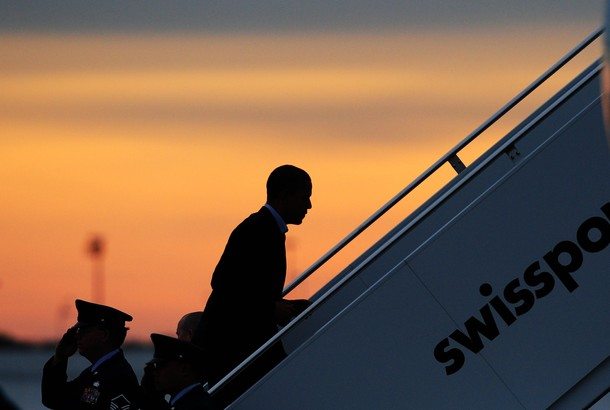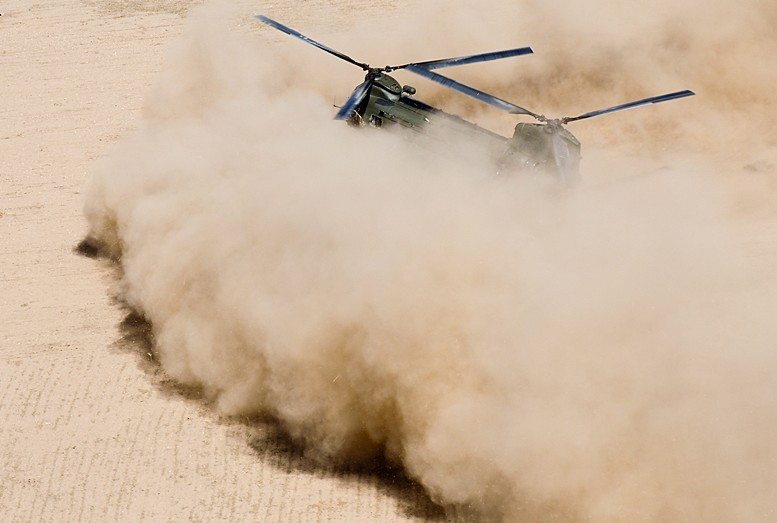It was in America’s vital interests to stop a massacre in Libya, President Barack Obama said today at the National Defense University.
Obama spoke of the justification for establishing the no-fly zone over Libya and protecting the Libyan people from Moammar Gadhafi’s regime to an audience of students and faculty gathered at Lincoln Hall on Fort Lesley J. McNair here.
Obama spoke of the cruelty that Gadhafi showed in suppressing Libyans who wanted a different government for the country.
“In the face of the world’s condemnation, Gadhafi chose to escalate his attacks, launching a military campaign against the Libyan people,” Obama said. “Innocent people were targeted for killing. Hospitals and ambulances were attacked. Journalists were arrested, sexually assaulted and killed.”
Gadhafi ordered his soldiers to cut off food, water and fuel to cities along the coast, and shelled cities and towns. “Military jets and helicopter gunships were unleashed upon people who had no means to defend themselves against assault from the air,” he said.
“Confronted by this brutal repression and a looming humanitarian crisis, I ordered warships into the Mediterranean,” the president said. “European allies declared their willingness to commit resources to stop the killing. The Libyan opposition, and the Arab League, appealed to the world to save lives in Libya.
“At my direction,” he continued, “America led an effort with our allies at the United Nations Security Council to pass an historic resolution that authorized a no-fly zone to stop the regime’s attacks from the air, and further authorized all necessary measures to protect the Libyan people.”
The coalition began military operations to enforce the U.N. resolution nine days ago, after it became apparent that regime forces were bearing down on Benghazi – the stronghold of the rebellion and home to more than 700,000 men, women and children.
“We knew that if we waited one more day, Benghazi … could suffer a massacre that would have reverberated across the region and stained the conscience of the world,” Obama said.
“It was not in our national interest to let that happen,” the president said. “I refused to let that happen.”
After consulting congressional leaders, Obama ordered the strikes to save Benghazi. “We hit Gadhafi’s troops in neighboring Ajdabiya, allowing the opposition to drive them out,” he said. “We hit his air defenses, which paved the way for a no-fly zone. We targeted tanks and military assets that had been choking off towns and cities and we cut off much of their source of supply. And tonight, I can report that we have stopped Gadhafi’s deadly advance.”
The United States acted as leader of a coalition of nations. The United Kingdom, France, Canada, Denmark, Norway, Italy, Spain, Greece, Turkey, Qatar and the United Arab Emirates joined in the responsibility to defend the Libyan people, Obama said.
“In just one month, the United States has worked with our international partners to mobilize a broad coalition, secure an international mandate to protect civilians, stop an advancing army, prevent a massacre, and establish a no-fly zone with our allies and partners,” he said.
“To lend some perspective on how rapidly this military and diplomatic response came together, when people were being brutalized in Bosnia in the 1990s, it took the international community more than a year to intervene with air power to protect civilians,” he continued. “We did it in 31 days.”
These objectives are consistent with the president’s pledge that the U.S. military role would be limited. No U.S. ground forces are in Libya, and unique American capabilities that were important at the beginning of this operation are being withdrawn. However, American support will continue as NATO takes command. “This transfer from the United States to NATO will take place on Wednesday,” Obama said.
Still, the United States will continue to work with international partners to provide assistance to the people of Libya, and the United States will hold in trust $33 billion of seized Libyan assets to help rebuild the country. Obama is sending Secretary of State Hillary Rodham Clinton to London where she will meet with Libyan opposition members and representatives from more than 30 nations.
“These discussions will focus on what kind of political effort is necessary to pressure Gadhafi, while also supporting a transition to the future that the Libyan people deserve,” Obama said. “Because while our military mission is narrowly focused on saving lives, we continue to pursue the broader goal of a Libya that belongs not to a dictator, but to its people.”
And the people of Libya ultimately must decide what happens in their country. “Gadhafi has not yet stepped down from power, and until he does, Libya will remain dangerous,” he said. He promised U.S. help as the process continues.
Obama appealed to American ideals and values in respect to stopping a massacre in Libya. “Some question why America should intervene at all – even in limited ways – in this distant land,” he said. “They argue that there are many places in the world where innocent civilians face brutal violence at the hands of their government, and America should not be expected to police the world, particularly when we have so many pressing concerns here at home.”
The United States cannot police the world, nor should it, the president said. “Given the costs and risks of intervention, we must always measure our interests against the need for action,” he said. “But that cannot be an argument for never acting on behalf of what’s right.
“In this particular country – Libya; at this particular moment, we were faced with the prospect of violence on a horrific scale,” he continued. “We had a unique ability to stop that violence: an international mandate for action, a broad coalition prepared to join us, the support of Arab countries and a plea for help from the Libyan people themselves. We also had the ability to stop Gadhafi’s forces in their tracks without putting American troops on the ground.”
America has a responsibility to lead and to help those seeking freedom, he said. “To brush aside … our responsibilities to our fellow human beings under such circumstances would have been a betrayal of who we are,” he said. “Some nations may be able to turn a blind eye to atrocities in other countries. The United States of America is different. And as president, I refused to wait for the images of slaughter and mass graves before taking action.”
Peace and ultimate stability in the rest of the region would have been affected if Gadhafi had been allowed to murder his people into submission. Just as Egypt and Tunisia are reaching for freedom, tyrants across the area would conclude that violence is the best strategy to cling to power.
“The writ of the U.N. Security Council would have been shown to be little more than empty words, crippling its future credibility to uphold global peace and security,” he said. “So while I will never minimize the costs involved in military action, I am convinced that a failure to act in Libya would have carried a far greater price for America.”
Gadhafi gone is best for the country, the president said. “But broadening our military mission to include regime change would be a mistake,” he said flatly. “The task that I assigned our forces — to protect the Libyan people from immediate danger, and to establish a no-fly zone — carries with it a U.N. mandate and international support.”
Overthrowing Gadhafi would splinter the coalition and require U.S. ground forces. “To be blunt, we went down that road in Iraq,” he said. “Thanks to the extraordinary sacrifices of our troops and the determination of our diplomats, we are hopeful about Iraq’s future. But regime change there took eight years, thousands of American and Iraqi lives, and nearly a trillion dollars. That is not something we can afford to repeat in Libya.”











